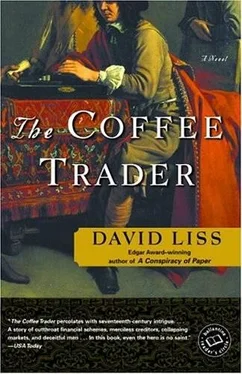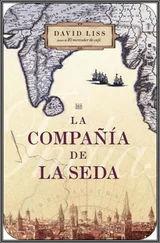Miguel felt himself redden.
“You thought no one knew of your reckless use of his name? You thought you could keep secrets from me on this bourse? And now you think you can outmaneuver me when I am determined not to be outmaneuvered? I admire your optimism.”
It meant nothing, Miguel told himself. He might have learned of Miguel’s trick from his broker. It did not mean Parido knew everything. “You’re doing nothing but boasting, senhor.”
“Very well, I’ll do more than boast. If you can bring the price to thirty guilders a barrel or below, I’ll allow you to buy ninety barrels from me at twenty guilders each.”
Miguel attempted to appear skeptical. “Where would you hope to get ninety barrels of coffee? Can the warehouses of Amsterdam have so much?”
“The warehouses of Amsterdam contain surprises that men such as you cannot imagine.”
“Your wager seems one-sided. What do you get if I cannot defeat you?”
“Well, you’ll be ruined, so I’m not sure you’ll have anything to give me but your person. So let us say this: if you lose, then you will confess to the Ma’amad that you lied about your relationship with Joachim Waagenaar. You will tell the parnassim that you are guilty of deceiving that council, and you will take the punishment that so grave a deception deserves.”
Cherem. It seemed like madness to agree to such a thing, but if he lost he would have to leave Amsterdam regardless. The banishment would make no difference.
“I agree. Let us draw up a paper to that effect, though what it is that I’ve agreed to will have to be kept between us, lest that paper later fall into the wrong hands. But I would like a surety of some kind. You see, I’d hate to win my wager only to discover you guilty of a windhandel -of not having the ninety barrels you promised.”
“What are you suggesting?”
“Only this. I’ll take your wager, and we’ll put it all to paper. And if, by some chance, you can’t supply the coffee at the price you mention, you will instead pay me what those barrels are, at this moment, worth. That would be”-he took a moment to calculate-“thirty-eight hundred guilders. What say you?”
“It is an empty bet, for I never sell what I do not have.”
“Then you agree?”
“Of course not. Why should I agree to a foolish wager that includes the possibility of my paying almost four thousand guilders?”
Miguel shrugged. “I won’t accept otherwise. I require the surety.”
Parido let out a sigh. “Very well, I’ll agree to your silly conditions.”
He quickly drew up the contract, insisting on writing out both copies himself. Miguel therefore had to waste more time reading it over, making certain his rival had not inserted any trickery into the language. But all appeared well, and the contract was witnessed by one of Parido’s friends who stood close by. Each man now had his copy in his pocket. The clock tower told him he had lost a quarter of an hour. It was time to begin.
Miguel took a step backwards and called out in Latin, “Coffee! Selling twenty barrels of coffee at forty guilders each.” The price hardly mattered, as Miguel had none of it himself. This, after all, was a windhandel . He had to make the price low enough to attract attention, but not so low that his call would arouse suspicion. “I have coffee at forty,” he called again. He then repeated the call in Dutch and again in Portuguese.
No one replied. Parido’s men began to move in, menacing Miguel like a pack of dogs. A minor trader from the Vlooyenburg glanced over at Miguel and appeared on the verge of taking the sale, but Parido locked eyes with him and the merchant turned away, muttering. It was clear that no Portuguese Jew would want to incur Parido’s anger by breaking the blockade.
Casting his eyes about the Exchange, Miguel saw Daniel hovering on the perimeter of their little crowd. He had dressed in his best trading suit today-not bright enough to wear on Shabbat but a handsome ensemble: matching crimson doublet and hat with a blue shirt beneath, black breeches, and shiny red shoes with enormous silver buckles. He looked at Parido’s men and at Miguel and then down at the ground.
Silence had descended over their little section of the Exchange. In the near distance he could hear the shouts of other transactions, but no one among the East India traders said a word. The battle had begun, and it surely appeared to the spectators that Miguel was already defeated. Parido smiled and whispered something in the ear of a member of his combination, who answered with a hoarse laugh.
Miguel called out his price again. A few Dutchmen looked on curiously but, seeing the crowd of menacing Jews, kept their distance. Miguel had nothing to offer that was sweet enough to either entice the Portuguese Jews to defy Parido or draw the Christians to trouble themselves with what was so obviously a duel among aliens. Standing alone in the midst of a circle, Miguel looked like a lost child.
He called out once more. Again, no reply. Parido met his gaze and smiled. His lips moved silently. You’ve lost.
Then Miguel heard the call in poor Latin. “I’ll buy twenty at thirty-nine.”
Alferonda had worked his contacts among the Tudescos. One of that nation, a man whose usual trade was in the discounting of bank notes, stood forth and repeated his call. He wore black robes, and his white beard swayed as he shouted out his bid. “Twenty barrels at thirty-nine!”
“Sold!” Miguel shouted. He could not help but smile. It was not the usual trader who hoped his buyers would keep lowering his price. But his business today was to sell cheap.
“I’ll buy twenty-five at thirty-eight and a half,” cried another Tudesco, whom Miguel recognized as a dealer in unminted gold.
Miguel pushed his way through the wall of Parido’s men to acknowledge him. “Twenty-five barrels at thirty-eight and a half, sold!”
The blockade had loosened. A sell-off had begun, and Parido knew he could not stop Miguel merely by keeping his men near.
“Thirty barrels of coffee to buy,” Parido shouted in return, “at forty guilders.”
The Tudescos would be fools not to turn around and sell for an immediate profit. They had never agreed to act as Miguel’s combination, only to break the blockade, motivated by the promise that their assistance would yield its own profitable opportunities. Miguel could see that they considered selling, which would stabilize the price for Parido. Portuguese Jews stood by and waited to see which way the prices went, which faction had command. The odds surely favored Parido. The only thing he could not counter would be a general sell-off. If too many men moved to sell, he could not stem the tide alone, and the men in his combination would not sacrifice their own money for him.
Here was the pivotal moment for the coffee scheme, and the whole of the Exchange sensed it.
Miguel looked up and, unexpectedly, locked eyes with his brother. Daniel stood at the far reaches of the circle of spectators, his lips moving silently as he calculated the odds against a gen-eral sell-off. Daniel tried to look away, but Miguel would not let him go. He wanted to see that his brother understood. He wanted to see it in his brother’s eyes.
And Daniel did understand. He knew that if he chose, at that moment, to join sides with Miguel, to throw himself in with his brother, to call out a sale of cheap coffee, the scheme would succeed. The momentum from Daniel’s participation would tip the scales in Miguel’s favor. Here was the time at last in which family might rise above petty interests. Daniel might say that yes, Parido was his friend, and friendship should be honored, but family was another matter and he could not stand by while his brother faced ruin, permanent ruin-not while he had the power in his hands to prevent it.
Читать дальше












